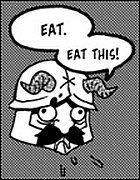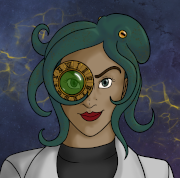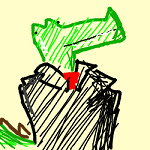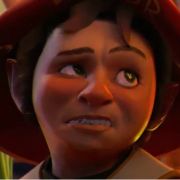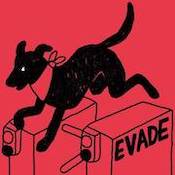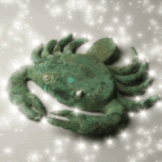|
Martello posted:It's not obvious at all. It sounds like he's saying that since his writing buddy didn't like his SCREW THE GALAXY book, that meant he wasn't the audience for it. Which is a ridiculous thing to say. My view is you should assume all critiques are accurate unless you're sure they're wrong. And being sure about something takes effort. quote:I was in a writer's group trying to get feedback. One writer said he didn't understand the subtitle: Screw the Galaxy. Hank never "screwed the galaxy." Like literally kicked the galaxy's rear end. At that point I realized, I gave my work to someone I shouldn't have. He will NEVER get it. And that's totally fine. My writing isn't for him. Doesn't mean I suck or he sucks or the galaxy sucks. This is not effort.
|
|
|
|

|
| # ? May 9, 2024 17:37 |
|
In the future, if I don't like someone's writing in Thunderdome or in the Farm, I will simply respond with "This wasn't my cup of tea," rather than addressing what didn't work for me. I'm glad I finally realize that people have varying tastes, and that we shouldn't try to evaluate things that we don't like. I was going to point out that having the protagonist dive head first into a railroad track, and then having a random observer say, "I wish I had your mutation!" did not work for me and felt like really bad and forced exposition through dialogue, but now I understand that it's just not to my taste and I would be wrong to make such comments. Instead I will just not respond, and you can assume non-responses and silence are actually negative critiques (which you should also ignore).
|
|
|
|
systran posted:In the future, if I don't like someone's writing in Thunderdome or in the Farm, I will simply respond with "This wasn't my cup of tea," rather than addressing what didn't work for me. I'm glad I finally realize that people have varying tastes, and that we shouldn't try to evaluate things that we don't like. Best systran post of the year, right here.
|
|
|
|
Good advice from a goon on worldbuilding: http://www.sethdickinson.com/2013/08/30/we-need-worldbuilding/#more-54 Seriously, read it.
|
|
|
|
Caveat that I banged that out over lunch in response to a Twitter discussion, so don't expect a hermetically sealed monolith of logic. But I'm glad it was useful!
|
|
|
|
General Battuta posted:Caveat that I banged that out over lunch in response to a Twitter discussion, so don't expect a hermetically sealed monolith of logic. But I'm glad it was useful! Still, you managed to peg exactly why I cringe when people slam worldbuilding as nothing but loving the dog (which it often is, but as you say, but ...). I have about 10k words worth of notes on biological/anthropological details about aliens so I can make their action/reactions different from the human norm, and I try not to wedge my drat notes into the novel (I rely on beta readers telling me, "Throw me a frikken bone here." before adding exposition). I also have a few thousand words dedicated, not to how future technologies might work, but how people use their crap on a daily basis and how they take it for granted, who has the tech, who doesn't, and why, and how it alters how they communicate. I always figured since writers have trouble with that today (such as conveniently forgetting that cell phones exist when they might easily solve the plot problem) wasting a few words to work that poo poo out in advance was worth the effort. So yeah, what you said clicked with me, and mentioning how well Ursula Leguin does it was really interesting. Edit: Harlan Ellison also has an interesting essay about Pretty Maggie Moneyeyes called The Whore With a Heart of Iron Pyrite: or Where Does a Writer Go to Find Maggie? that talks about how he builds the background details in his head about every character he writes. Imagining what kind of apartment Maggie lived in, even though you never get that detail anywhere in his story, was one of the details he needed to imagine what kind of person she is. Stuporstar fucked around with this message at 03:00 on Nov 3, 2013 |
|
|
|
Perhaps we'd feel more comfortable if we could delineate: world-creation - the author's process of understanding, off-book, the little and big details that make a secondary world compelling and generative to a plot worldbuilding - the nature of writing that contributes to the sense of a world and its differences from our own, in any way exposition - writing that describes a world, by describing it The first two are absolutely necessary while the third is a blunt instrument to be used with care. My favourite SF novel of recent years was The Quantum Thief precisely because its technological worldbuilding was done en passant. It gave you the sense that the author (as character) was holding a lot more back, and room to imagine what that might be. Though annoyingly, the social details are still pretty derivative - Elliot wouldn't be happy.
|
|
|
|
As a budding copywriter and fiction writer, I feel somewhat like a fish out of water as a former International Studies major/careerist in college when it seems like everyone else is an English major and talk to each other as such. I'm sure there a lot more people out there who don't fit the typical mold like me, but it does feel strange. That being said, is there any advice for self-studying for a pseudo-English BA education as a well-educated writer? Any syllabi or books I should look at for this kind of hobbyist self-study? Anything like MIT OpenCourseWare that might help me?
|
|
|
|
TheRamblingSoul posted:As a budding copywriter and fiction writer, I feel somewhat like a fish out of water as a former International Studies major/careerist in college when it seems like everyone else is an English major and talk to each other as such. I'm sure there a lot more people out there who don't fit the typical mold like me, but it does feel strange. Actually almost no one who posts about fiction writing on these forums is/was an English Major. I have no idea what you mean by people "talking to each other as such." Self-study for writers consists mostly of reading books, thinking about books, and writing. Getting criticisms helps, too. There are lots off how-to write books mentioned in this thread, so I'll throw out a couple on how to read: Thomas C. Foster has a couple books on how to read like a professor. These cover looking for themes and references (i.e. Most trips are quests, eating is communion, how to spot a Christ allegory, etc.). I've got How To Read Literature Like A Professor, and it's interesting, but a little bit dry, much like most of the lit classes I took in college. Reading Like a Writer, by Francine Prose, focuses more on different parts of writing, with chapters on dialogue, paragraph structure, and diction. It was also a tad easier for me to get into. I believe both of these books come with a recommended reading list, and one will rarely suffer by reading the classics. However, it's also important to read the kinds of books you want to write. If you want to write paranormal romance, you should strongly consider sitting down with the Twilight series for a slow, in depth read. (Sounds fun, right ?) Sure it might not be as richly textured as Dickens, as intellectual as Nabokov, or as gracefully spare as Hemingway, but if it's a stand out success in your preferred genre, it deserves some serious consideration as to why it works. Then, write write write! Most English classes actually teach you to write about other people's fiction, not how to write your own. To improve as a fiction writer, you MUST write fiction. That doesn't include thinking about writing, talking about writing, or even outlining/character descriptions/research for writing--although all those things have their place. You need to sit down and write actual scenes--preferably actual stories! Seeking out criticism can be scary, especially at first, but it is extremely helpful. An objective set of eyes on your work will find all kinds of mistakes, weaknesses, and inconsistencies. It's nothing to be ashamed of. Best-selling authors have editors (and fawn all over them in Acknowledgements) for a reason. Get out there, make mistakes, and be willing to learn from them. If you are struggling with grammar and parts of speech, Strunk & White is the classic go-to, though it is too prescriptive in my opinion. Eats, Shoots & Leaves is another good grammar book with a sense of humor. Edit: you can also check out free online classes on websites like Coursera. The offerings for writing look extremely basic and are not focused on creative writing, but if you would like semi-formal instruction on how to put sentences and paragraphs together, they might help you. Coursera also offers a smattering of "literature" classes, for example there is one right now on historical fiction. There have been past classes on relationships in fiction and sci-fi/fantasy. These classes typically focus on reading in the genre, not writing. Thus, the historical fiction class covers "what is historical fiction," the history of historical fiction, and includes readings and discussions with current historical fiction authors. Dr. Kloctopussy fucked around with this message at 00:03 on Nov 9, 2013 |
|
|
|
Martello posted:Personally, I very much dislike present tense. I don't know if it's just a preference thing or what, but any time I'm reading a story and realize it's present tense I immediately groan. It just smacks of "artistic" writing where you change up conventions just for the sake of it. Admittedly, sometimes it can work, but I think more often it doesn't. It's kind of like not using quotes or whatever. Yes, Cormac McCarthy does it, but that doesn't mean you should. In fact, McCarthy shouldn't do it either. I didn't have the same experience when I read Pattern Recognition. Its being written in present tense made it a little difficult for me to adapt to, but that's nothing compared to Gibson's famously florid phrases. I often find that when a writer is doing something of interest with regard to style, it's more difficult to adjust to. Take Gabriel Garcia Marquez. When I started reading Love in the Time of Cholera (translated, but these features weren't a function of translation) I found it quite difficult and dry: Marquez always writes in the same pseudo-synoptic style. As I adapted more to Marquez's writing style I started noticing the interesting things he does, like segueing between different levels of synopsis to create particular effects. Saying he writes like a history book wouldn't be inaccurate but nor would it be a criticism: if Marquez wrote history books, he'd be up for a Pulitzer Prize on the basis of style alone. Compared to the unique literary devices and rhetoric each writer employs, something like present vs. past tense is practically insignificant. I think there's a very real risk of 'always use past, third-person' becoming an orthodoxy, which is a pity because I take the view that whatever style and voice is best for expressing a particular story is the one you should use.
|
|
|
|
I appreciate the advice, thank you. In terms of a pseudo-English BA versus a pseudo-MFA in Creative Writing, I mainly want to understand why certain usages of tone, grammar, etc work the way they do as well as having a better intellectual tool-set to analyze and dissect (classic) authors like Tolstoy, Dostoyevsky, Shakespeare, Hunter S. Thompson, and other great writers and why their writing "works". Does that make sense?
|
|
|
|
That makes sense, but I'm not sure it's something you couldn't get just by reading them a lot.
|
|
|
|
Don't read Shakespeare. You should not ever read Shakespeare. Go find a theatre company and watch them perform Shakespeare, you will have a much more satisfying time.
|
|
|
|
Blade_of_tyshalle posted:Don't read Shakespeare. You should not ever read Shakespeare. Go find a theatre company and watch them perform Shakespeare, you will have a much more satisfying time. While it's not for everyone, I enjoy reading Shakespeare. I like to read it and then go see it, because knowing the source material makes me feel like I can appreciate what they're doing with it more, because Shakespeare is one of those things that can be so different each time you see it. But that might just be me. I also enjoy reading scripts in general. I'm only now just thinking that is kind of weird after all.
|
|
|
|
TheRamblingSoul posted:I appreciate the advice, thank you. Honestly the best thing you could do is to just read widely and read often. You might also try to develop a friendship with someone who shares your interest in literature. If you have someone who is reading the same books or has the same general literary interests then talking to them will be extremely helpful. There are certain insights or ideas that are far better developed through conversation with another interested party. As far as formal education you might consider checking out The Teaching Company. They do courses on a wide variety of topics, including literature and writing. You should be warned that these courses are very expensive. I think they are this expensive because some jerk makes a lot of their stuff freely available on torrent sites, forcing them to charge more.
|
|
|
|
PoshAlligator posted:While it's not for everyone, I enjoy reading Shakespeare. I like to read it and then go see it, because knowing the source material makes me feel like I can appreciate what they're doing with it more, because Shakespeare is one of those things that can be so different each time you see it. I agree. If I read a play first then go see it, then I end up enjoying myself much more. I get my own feel for how lines should be said in my head, and its fun to then see how it gets interpreted on an actual stage. Though reading Shakespeare is definitely time consuming and unless you personally enjoy the way he uses words I can see how reading his work is definitely not for everyone. So ultimately if you like it then read him. If not then don't. It's not a big deal. Rambling Soul, as others have said the best thing to do is to read from a variety of authors. Find authors that you like, and try to read a bunch of their works. Take your time, work your way through their work slowly and see what it is that they do that is effective. Make note of passages that you personally find ineffective as well and try to pin down what it is that you think went wrong. If you do this a lot, you'll develop a much better ear for words over time and you will begin to automatically pick up on nuanced stuff like tone.
|
|
|
|
Alright, so for my upcoming Thunderdome entry, I want to have the narrator recount the story in past-tense as if he were talking to the audience (imagine an invisible therapist) as an adult looking back on a traumatic experience he had as a kid or a teenager. That being said, my question is: How should a first-person narrator "talk" to the reader while also describing past events? Should I forgo quotation marks when the narrator is commenting directly to the reader and save it for actual spoken dialogue that takes place in the past? I'm a little worried I might confuse the reader trying to both talk to the audience in the present-tense but also recall experiences in the past as he narrates. I keep tossing around the idea of a quick lead-in intro that takes place in the present between the narrator and a therapist and then going into the "past narrative" (think movie-version of Great Gatsby or the Tell-Tale Heart by Poe) but, given the word count and for sake of brevity, I feel more and more that I just want to axe this intro part and jump straight into the "meat" of the action to keep the story from dragging in the beginning. Any thoughts? [e]: I also really want the first line to be the narrator commenting on his regret or asking the reader about regret as a way to hook the reader in. E.G., "You wouldn't blame me for making a mistake, would you?" (Narrative starts here) In other words, the Narrator is mainly talking to You (the reader) as well as reflecting on his past trauma as a kid. It's kind of like a confessional to get the burden off his chest since he felt partly responsible for what happened by not doing enough to stop said incident. Teriyaki Koinku fucked around with this message at 17:33 on Nov 12, 2013 |
|
|
|
TheRamblingSoul posted:That being said, my question is: How should a first-person narrator "talk" to the reader while also describing past events? quote:I'm a little worried I might confuse the reader trying to both talk to the audience in the present-tense but also recall experiences in the past as he narrates. I don't think it's that big a departure from normal first-person writing. I opened the door to see Ricky there. I could tell from his grin that he had another one of his plans. I hadn't learned yet that Ricky's plans always spelled trouble. I can't believe I was so stupid back then. "Ricky!" I said. "What's going on?" He smirked. "I know where we can get a big score all for ourselves. Big enough to get us out of this town." That was enough to get me onboard, no questions asked. quote:Should I forgo quotation marks when the narrator is commenting directly to the reader and save it for actual spoken dialogue that takes place in the past? Yes. In first person, all things not in quotes are automatically taken as addressing the reader. Adding quotation marks for lines directed to the audience and not to a person in the scene is actually more confusing than leaving them out. Just have your first line as: You wouldn't blame me for making a mistake, would you? Stabbey_the_Clown fucked around with this message at 17:38 on Nov 12, 2013 |
|
|
|
Thank you for the advice. I was worried because I was thinking over the other narrative-style I was imagining (ie present-tense narrator is talking to a therapist as an actual character) Here's an example [not actually going to be in the story]: --- I craned my neck and looked askance at Bob, my therapist. "Really, you want me to tell everything?" "Yes, of course, Shane. Why don't you start from the beginning?" I sighed. "Well, if you insist..." [Past narrative starts here] It all started one day at the zoo. Bill was... (etc. etc.) "Hey Shane, you dummy!" Bill said to me. I looked over at him (etc. etc.) "And then what?" my therapist asked. (etc. etc.) --- I think "double-layering" the narrative like that, actually writing it out now, would make the story needlessly convoluted and distract the reader instead of immersing them. I think it's better just to jump straight into the narrative and act as if the reader is the invisible therapist. [e]: Also, this is my first Thunderdome challenge ever; it's a little intimidating at first competing with other writers but now it's surprisingly a ton of fun actually having a reason and prompt to write something creative for once!  I haven't written fiction for a good while now! I haven't written fiction for a good while now![e2]: While I'm thinking about it, how should I break up blocks of extended dialogue or monologue? Example: ------------------ "Jerry," Cindy started, "I... Don't think this is going to work out." Jerry's eyes bugged out. "What!? Why?" "You've never taken the dog out, the dishes are always a mess, and you reek constantly. How on earth do you expect to take care of our unborn child? "Honestly, Jerry, it's a miracle I haven't left you already by now." (etc. etc.) ------------------------- I want to know, essentially, how to break up larger blocks of spoken text. Isn't there something about sentence chunks only having one quotation mark at the beginning of the sentence or something? Teriyaki Koinku fucked around with this message at 18:04 on Nov 12, 2013 |
|
|
|
TheRamblingSoul posted:
I'm not sure if you are asking a technical question about punctuation or a broader question about how to split paragraphs in a monologue so they flow. For punctuation questions, learning how to look bothersome little questions up is a skill worth developing, though it does require learning the correct vocabulary. There are plenty of decent punctuation guides in print and free online. It does take some practice--a quick google search for 'punctuation quotation marks' turns up guidelines for non-fiction writing, not dialogue. The first result for 'punctuation dialogue' answers the question of how to punctuate multiple paragraphs of dialogue from a single character with no dialogue tag: each paragraph begins with an open quote, but only the final paragraph ends with a close quote. If you are asking more generally about where the paragraph breaks should go for readability, clarity, and flow... There's no set abstract answer that someone can explain to you. You really need to walk over to your bookshelf and start pulling out books you like--I'd say look for one in first person since you seem to be struggling with that a bit--read it and see how the author handles these situations. Then repeat because different authors will handle it differently!
|
|
|
|
Dialogue. Dialogue. Dialogue. I'm hoping if we say it enough, Chillmatic will appear.
|
|
|
|
systran posted:Dialogue. Dialogue. Dialogue. Don't you have to be looking in a bathroom mirror?
|
|
|
|
TheRamblingSoul posted:Thank you for the advice. I think you have the right idea. You are better off writing this in a way that is clearly narrative. What I mean is instead of relating all of the dialogue like you do, just tell the story. Imagine yourself as the guy sitting in the chair, talking to your therapist (i.e. your readers). Anything else is absolutely too convoluted. e.g.: quote:Look Bob, seeing as you charge by the hour I don't mind getting straight to the point. My dick stays limper than a wet hot dog bun, even when I'm watching dogfucking. And to answer your other question about paragraphs, if I understand you correctly, you break up paragraphs within spoken dialogue by starting a new paragraph with an open quotation mark (but don't close the end of the paragraph). Like this: quote:"I was explaining to this guy how to write dialogue. Well, it was more about punctuation than actually how to write dialogue, but I'm pretty sure he would benefit from learning how to write dialogue, considering how bad the stuff he posted was.
|
|
|
|
Any advice for beating the cliche reflex out of me when it comes to writing dialogue and characters? That's a problem I keep running into, before in a creative writing workshop and now with Thunderdome. I know I can write better than this, so I'm open to learning and improving. It helps to deflate the ego.
|
|
|
|
TheRamblingSoul posted:Any advice for beating the cliche reflex out of me when it comes to writing dialogue and characters? That's a problem I keep running into, before in a creative writing workshop and now with Thunderdome. For dialogue and exposition: Draft however you want, go do something else, then reread slowly with fresh eyes. Mark your cliches (GDocs comments are great for this) and then go back to revise them after you've finished a reread. If you can see it, you can fix it. One way I spot problems is to move my work into a different format (change fonts, change programs, print it out, etc.) for proofreading. If you're having trouble spotting cliches at all, then you pretty much have to take the cliched advice to read more books. Dialogue is especially tricky and I find myself rewriting dialogue more often than anything else. My first drafts are usually terrible exchanges where characters speak directly to one another, slap down exposition, etc. Don't sweat it, just fix it later. For characters: This I tend to plan out in advance. I'm a "planner" when it comes to writing; I scope out the broad concepts first then backfill the details. I tend to come up with a 1-2 sentence concept for a character, then start sketching down interesting details as I think about the character's intended role in the story, and what might've guided the character to have the personality/motivations that I need to tell the tale I've planned. Rereading those notes, you'll find the cliches and can cut them or twist them. A cliche that's been bent just beyond recognition makes for a familiar-but-still-interesting character.
|
|
|
|
Thank you for the advice. I meant more specifically about recognizing cliches to begin with, like I think I'm writing good dialogue but it actually reads as cliched to someone else.
|
|
|
|
Well think to yourself, "Why am I writing these words?" Is it because that's how you heard somebody else say it? In normal everyday speech, this is what we do most often: put phrases together and use idioms. You want to try to avoid that as much as possible. Learning to recognize it is just a matter of reading your story and thinking "why did I write things that way?" Don't write things just because that's how you've seen other writers do it or because that's how you've heard it. Make something new and weird. That said, write your stories with cliches. I do. Just get that feeling out and the story done. Let your brain take a shortcut while you focus on getting the story out. Going back and punching up the dialogue is easy, and best saved for a later edit. Some people would probably disagree with me.
|
|
|
|
I have marked most of your cliches and some other stuff: https://docs.google.com/document/d/1F16WPuqJWJHBZKRn019N3TVOJXQ6tbSTNKY34U8vUNw/edit I am quoting this everywhere, but I will do it here again: quote:The whole point of a short story is to assassinate the reader. You don’t have the time or the space to go to war or do large maneuvers, you can’t do chapters of elaborate setup, there’s much less room for character development—a good writer can get more character development in, but that isn’t my particular strength. Anyway, everything in the short story has to drive toward a short sharp point, whatever it is you’re trying to leave the reader with at the end of the story. Your story is basically the opposite of this. You waste your time and space with pointless stuff, and you do KIND OF drive toward a "sharp point," at least. The thing is, your sharp point is visible from the very beginning. As soon as we see Nick being a douche, we know he's going to be eaten. Everything that happens after we realize that is just the stuff happening in a straight-forward and obvious manner. I only read about four entries from this week, but crabrock's did the quoted advice pretty well: The parents split up with each kid, saying it will be better that way. The wife cries, and we are not sure why. The dad comments on different animals in a way that shows he is feeling trapped. The kid comes off as awful and makes you feel as a reader, "I do not want kids." When the dad reveals the divorce thing, even though he comes off as insufferable, you still do kind of feel for him. You then also feel for this poor kid on a leash getting pills shoved down his throat. The "sharp point" is obscured until the end, but you start to see it more clearly as the story progresses. After we see the point at the end, we can think back, "Ah, that's why the wife was crying, and that's what those comments about 'it will be better this way' were for." angel opportunity fucked around with this message at 15:46 on Nov 18, 2013 |
|
|
|
TheRamblingSoul posted:Thank you for the advice. I meant more specifically about recognizing cliches to begin with, like I think I'm writing good dialogue but it actually reads as cliched to someone else. My favourite advice for writing dialogue is actually from Scott Adams of Dilbert; he says people in real life never talk to each other: instead they talk around, and against, and in spite of each other.
|
|
|
|
Stuporstar posted:Good advice from a goon on worldbuilding: http://www.sethdickinson.com/2013/08/30/we-need-worldbuilding/#more-54 Great read indeed, it explains why fantasy theta doesn't take place in the real world has such a hard time reaching the mainstream; because it's constantly appealing to awkward geek fantasies rather than relate to how the real world works (hence why most successful mainstream sci-fi and fantasy takes place in the real world or the post apocalyptic version of it). Tell me if I'm reading it wrong. The series of tweets the blog entry is based on completely lost me though because that person somehow managed to connect it to colonialism and privilege, rather than the fact that people like to read about medieval superheroes and not about sharecroppers and struggling single mothers (which I agree is unfortunate).
|
|
|
|
I'm not sure I'd agree that fantasy set in secondary worlds has trouble reaching the mainstream. If anything, I think big sprawling secondary-world epic fantasy is some of the most mainstream fiction. Between Tolkien and George R. R. Martin, fantasy sales were dominated by sprawling, fairly puerile save-the-world stories (which, like you say, appeal to pretty adolescent power fantasies). A lot of successful fantasy today is still set in secondary worlds, though you're right that superhero, zombie, and post-apocalypse stories have really taken off. But a few writers - LeGuin is the first to come to mind, but I know there are others - managed to write genuinely interesting secondary worlds, and I think a lot of that comes down to their ability to texture. The original set of tweets is right, I think, to connect the issue of worldbuilding to colonialism - basically, if you leave your secondary world hazy, people will fill it with their defaults, which are probably going to be white and sort of Ren Faire European. It's been pointed out to me by non-American friends, though, that if you're not a writer from a colonial power, your defaults aren't going to be particularly colonial.
|
|
|
|
Adam Gopnik had a really interesting article in the New Yorker a little while back on why various types of epic fantasy appeal to teenagers. He primarily looked at The Lord of the Rings, Eragon and Twilight but his comments are widely applicable I think. One of his main points is that for certain audiences the world building is actually the real attraction. The narratives and the characterization are typically exercises in cliche, filled with warmed over stereotypes borrowed from Star Wars or Lord of the Rings. The real appeal is that the reader is immersed in and then masters a fake world history and mythology. quote:This is surely the most significant of the elements that Tolkien brought to fantasy. It’s true that his fantasies are uniquely “thought through”: every creature has its own origin story, script, or grammar; nothing is gratuitous. But even more compelling was his arranged marriage between the Elder Edda and “The Wind in the Willows”—big Icelandic romance and small-scale, cozy English children’s book. The story told by “The Lord of the Rings” is essentially what would happen if Mole and Ratty got drafted into the Nibelungenlied. (J. K. Rowling intuitively followed this part of the formula by mixing a very old-fashioned kind of English public-school story in with Tolkien’s sword-and-sorcery realm.) quote:Books win their audiences for a reason. Most popular books wear their artlessness on their sleeve: Stephenie Meyer, the author of the “Twilight” series, is an awkward writer with little feeling for construction, but the intensity of emotion with which she imbues her characters is enviable. You never doubt her commitment to the material, which is half the battle won. So to say that Paolini is an unskilled narrator and a derivative mythmaker is more or less beside the point. What is it, then, that makes the books enter kids’ consciousness?
|
|
|
|
Helsing, good pull. Re: that thing from Battuta's blog a few weeks ago: If you want to write a story in a secondary world based on Medieval Europe, go ahead. Just know that you need to do it well, since it's been done a million times before. You can still stick close to the historical source material; no need to change Fantasy High Middle Ages France into a social justice utopia. But make the characters real. Racism and sexism and cruelty and prejudice can and should exist in your story. Just make sure your writing isn't those things. As a European-American or European, it's very understandable to want to draw on such a rich, interesting, and loving dark period in our collective history. And there's no reason to only ever write Fantasy High Middle Ages France and England with Plate Mail (barf) and Longswords. There are so many intersting cultures and periods in the European Middle Ages to draw from. Why not base your story on Hungarian principalities, or a Saxon kingdom, or Italy during the Late Middle ages, with armies of ork condottieri fighting for your fantasy Italian elves? If you want to write a story based on Polynesian mythology, or something you've made up entirely where women and transexuals of color rule your fantasy world, that's also fine. One isn't better than the other. They're both fantasy stories set in a secondary world. Just because it's a fantasy world doesn't mean it has to be a perfect modern fantasy society. Stories about flawed characters set in flawed societies are often the most interesting.
|
|
|
|
The problem in writing racist sexist medieval Europe settings is that people usually botch the way the racism and sexism worked. Women had a fair bit of power in medieval society, and there were a lot of non-white people with roles in these societies beyond 'outsider' or 'slave'. Of course, both women and POC were constrained by the institutionalized misogyny and xenophobia of the system they lived in, and you can tell really compelling stories about those flaws. Just don't write a rape-happy world of whores and housewives while crying that women were never rulers and never soldiers and never powerful and call it a realistic depiction of medieval misogyny: you've elided both the actual roles that women played in medieval society and the ways they tried to resist or just live within the power structure.
|
|
|
|
General Battuta posted:The problem in writing racist sexist medieval Europe settings is that people usually botch the way the racism and sexism worked. Women had a fair bit of power in medieval society, and there were a lot of non-white people with roles in these societies beyond 'outsider' or 'slave'. Of course, both women and POC were constrained by the institutionalized misogyny and xenophobia of the system they lived in, and you can tell really compelling stories about those flaws. Just don't write a rape-happy world of whores and housewives while crying that women were never rulers and never soldiers and never powerful and call it a realistic depiction of medieval misogyny: you've elided both the actual roles that women played in medieval society and the ways they tried to resist or just live within the power structure. Oh yeah, that's one of my pet peeves, is people delving no further than the Victorian idea of what Medieval life was like, which was actually based on the Renaissance and half made up for moralizing purposes, and the writer transposing their own juvenile ideas onto it--ending in a fantasy world where politics are based entirely on Borgia backstabbing and every woman gets raped.
|
|
|
|
This was fascinating. I've often tried to work out why I love Dune so much, unwieldy as it is, and I think a lot of it's to do with the power of the environment as creative canvas. It might explain why books with fantastical elements tend towards a certain type of personality: people who ponder and project, who are looking for worlds to put themselves into.
|
|
|
|
Coma did you ever get that upside down world story that you wrote published somewhere?
|
|
|
|
General Battuta posted:The problem in writing racist sexist medieval Europe settings is that people usually botch the way the racism and sexism worked. Women had a fair bit of power in medieval society, and there were a lot of non-white people with roles in these societies beyond 'outsider' or 'slave'. Of course, both women and POC were constrained by the institutionalized misogyny and xenophobia of the system they lived in, and you can tell really compelling stories about those flaws. Just don't write a rape-happy world of whores and housewives while crying that women were never rulers and never soldiers and never powerful and call it a realistic depiction of medieval misogyny: you've elided both the actual roles that women played in medieval society and the ways they tried to resist or just live within the power structure. I couldn't agree more, I should have made this point myself. I was just a little worried when I read your original blog post that you were saying, unequivocally, that there's something inherently wrong with writing Europe-based fantasy. I'm glad I gave you the benefit of the doubt.
|
|
|
|
Happy not to disappoint.
|
|
|
|

|
| # ? May 9, 2024 17:37 |
|
General Battuta posted:Happy not to disappoint. I just finished reading The Amazing Adventures of Kavalier and Clay where one of the main characters is gay in the loving 1940s, and what happened to him was heartbreaking. It's totally possible. It's just a matter of projecting your sympathies from the right angle. I know I've worried about the same thing in the past, and it took me way too long to figure out it all comes down to POV. I know you probably don't need this advice, General Battuta, but I've noticed some of the most unintentionally offensive writing comes from dudes who have a male proxy character fixating on their far more interesting female character, because they're too loving scared to write from a woman's POV. I've told several of these people to scrap the male character (with zero personality except horny for the interesting chick) and write from the girl/woman's POV instead, and they always wuss out and walk away from the challenge little boys. It's loving frustrating when they've managed to come up with honestly amazing female characters, but refuse to get inside their heads.
|
|
|








